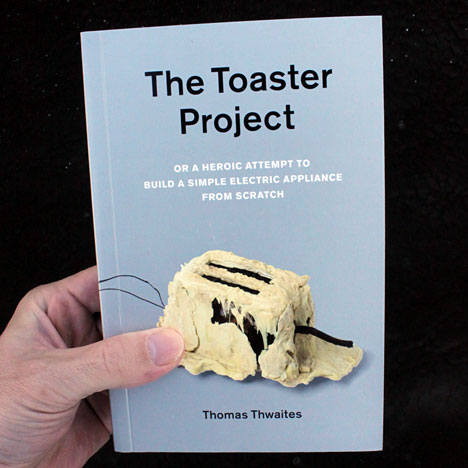
Thomas Thwaites opens his recent book with a quote from Mostly Harmless, the last book that Douglas Adams wrote in his Hitchiker's Guide to the Galaxy series: "Left to his own devices he couldn't build a toaster. He could just about make a sandwich and that's it." The protagonist, Arthur Dent, finds himself stranded on a planet of limited technological sophistication and after initially hoping to impress the locals with his technical knowledge, he rapidly realizes that all of his knowledge is predicated upon preexisting technology. Somewhere between a travel romp and an investigation of the modes of production in a modern capitalist society, The Toaster Project tracks his quest to build an entire appliance "from scratch." The sad little toaster he built appears on the cover and looks more like a poached egg than a modern convenience, but by the time the narrative is finished, it's pretty clear that it was a quickly-scrambled quest to get it to look like anything at all.

Henry Petroski's The Pencil is the most well-known examination of a seemingly simple technology, but Petroski catalogued the manufacturing process rather than actually mining and building a pencil. Thwaites is more ambitious, though his enthusiasm leads to compromise before nearly every insight. He begins simply enough, by reverse engineering the cheapest toaster he can find (3.94 British Pounds), only to find that it has 404 different parts. He catalogues those parts into 5 different materials (steel, mica, plastic, copper and nickel), and then sets about making a comparable appliance with a clear set of rules. The remainder of the book reads as a travelogue of the resultant exploration.

The following pages could just as easily be read as a comedic exposé, a mad quest towards a seemingly unattainable goal, or a philosophical indictment of the complexities of modern life. Thwaites's voice is most suited to the first two, and those are the pieces most likely to captivate most readers. Industrial designers may find themselves wishing for slightly more technical insight, particularly at the end, but even with those compromises towards the lay audience, for those of us who cobbled together foam models and PowerPoint slides for our thesis projects (like myself), it's pretty tough to cast the first stone at someone who actually explores what it means to make something.